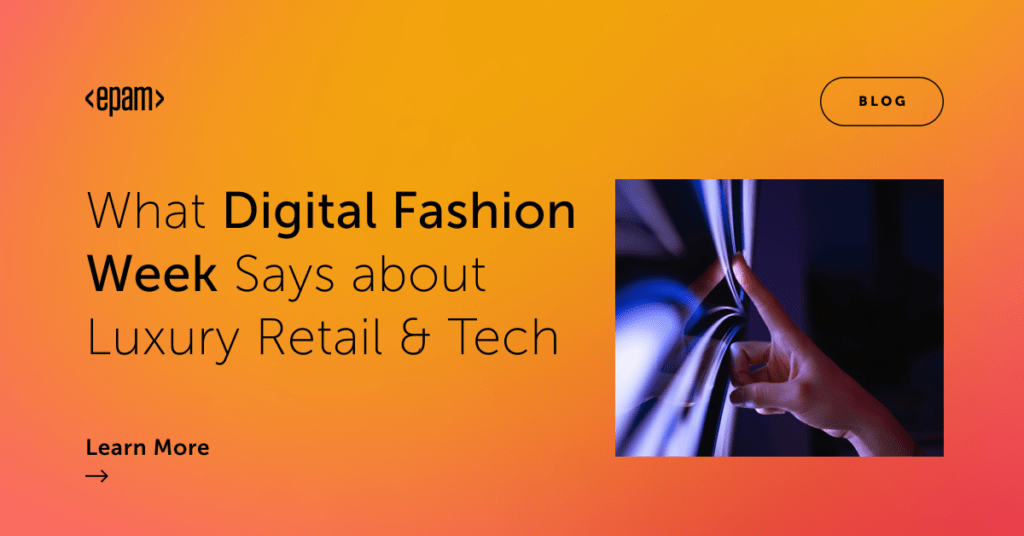Fashion has always walked at the forefront of social and cultural change. At the heart of this dynamic industry beats the renowned Fashion Weeks, held in the world’s most iconic cities.
Fashion Weeks provide an unparalleled platform for designers and iconic fashion houses to showcase their creativity, innovation and vision, celebrate legacy, display new collections and set the tone for the upcoming season. For designers and brands, Fashion Weeks are an opportunity to highlight their adaptability and relevance in the modern world.
Digital Fashion Week, the satellite event orbiting all the major Fashion Weeks, just demonstrated the impact and potential of digital fashion in reshaping the industry. Digital fashion, at its core, refers to fashion that exists in the digital realm, offering a new dimension for self-expression and creativity. It can democratize luxury. Regardless of size, shape or physical limitations, anyone can own a digital haute couture piece. This inclusivity extends to customization, where consumers can modify digital garments to fit their unique style, breaking the barriers of traditional fashion norms.
The rise of digital fashion opens new revenue streams for designers and retailers. From selling digital garments for virtual events to licensing designs for video games and virtual reality platforms. Consumers can virtually try on outfits, walk through digital showrooms, or even attend virtual fashion shows, bridging the gap between the digital and physical worlds and serving a next generation of commerce.
Digital fashion, with its myriad of benefits, is not just a fleeting trend but a cornerstone of the industry’s future. As the industry embraces this digital revolution, we are not only redefining fashion but also paving the way for a more sustainable, inclusive and innovative future.
Personalized Experiences with AI & ML
AI and ML are revolutionizing personalization and efficiency at scale. AI can assist designers in spotting trends, generating design ideas and even predicting future fashion trends. By analyzing consumer behavior, preferences and purchase history, these technologies can predict future buying patterns, allow brands to smartly and effectively communicate with customers and offer personalized product recommendations. This not only enhances the shopping experience but also drives sales and brand loyalty.
Augmented & Virtual Reality for Immersive Shopping Experiences
Customers no longer need to visit a store to try on outfits. With AR and VR, consumers can now virtually “wear” outfits from the comfort of their homes. 3D fashion design tools such as CLO and Browzwear are offering experiences that were once futuristic. These immersive experiences allow consumers to interact with fashion in ways they’ve never done before. As hardware will significantly improve over the next few years – Apple’s Vision Pro, Meta’s improving quests, Google’s innovations – and edge computing increases, online shopping will become faster and more efficient. The fidelity of experiences will improve over time and high-speed data transfer will reduce website load times, ensuring that customers have a seamless and enjoyable shopping journey. AR e-commerce and spatial commerce are just new ways to engage in different ways with consumers. Trick is, the early adopters will be able to build competitive advantage. As brands continue to embrace and invest in these advanced technologies, they not only enhance the customer experience but also position themselves as pioneers in the ever-expanding frontier of fashion and luxury retail.
Hyperverticalization: Meeting Niche Needs
One of the most exciting evolutions is the rise of hyperverticalization. Hyperverticalization is all about niche segments such as art, sport and music, offering new experiences to communities. By leveraging advanced technologies like Web3, AI, gaming and immersive tools, fashion brands can cater to the unique needs and desires of specific consumer groups. This not only enhances brand loyalty but also drives innovation.
As brands embrace hyperverticalization, they’re not just offering products; they’re offering unparalleled experiences. The future of fashion is not just about what you wear but how you experience what you wear.
The Power of Web3 & Blockchain
Web3 is revolutionizing how we think about ownership and distribution. Brands can interact directly with their consumers, bypassing intermediaries or centralized platforms, fostering trust and building stronger relationships. With the rise of blockchain and smart contracts, fashion brands can now offer unique digital assets, ensuring authenticity and rarity. Imagine owning a limited-edition digital dress or tokenized fashion experiences that can be traded and sold. This enables brands to assure the genuineness of their fashion items, fostering trust and credibility.
Fashion Meets Gaming
Collaborations between fashion brands and popular games are becoming commonplace. Gamers can now create, own and trade exclusive virtual outfits, making their avatars runway-ready. The digital savvy generation already spends more than $100 billion a year on virtual goods, more than twice the size of the music industry. This fusion of fashion and gaming is creating a new avenue for brands to reach a younger audience. The gaming industry offers an untapped market for fashion brands to gamify experiences, digitize historical catalogues and convert these into in-game assets such as skins, merging the worlds of fashion and gaming.
Embracing the Future: Digital Transformation
The fusion of advanced technology and fashion represents a paradigm shift. Brands that embrace these innovations will not only stay relevant but will drive the industry forward, offering unparalleled experiences to their consumers. The future of fashion is digital, and it’s more exciting than ever. Walk with us!

